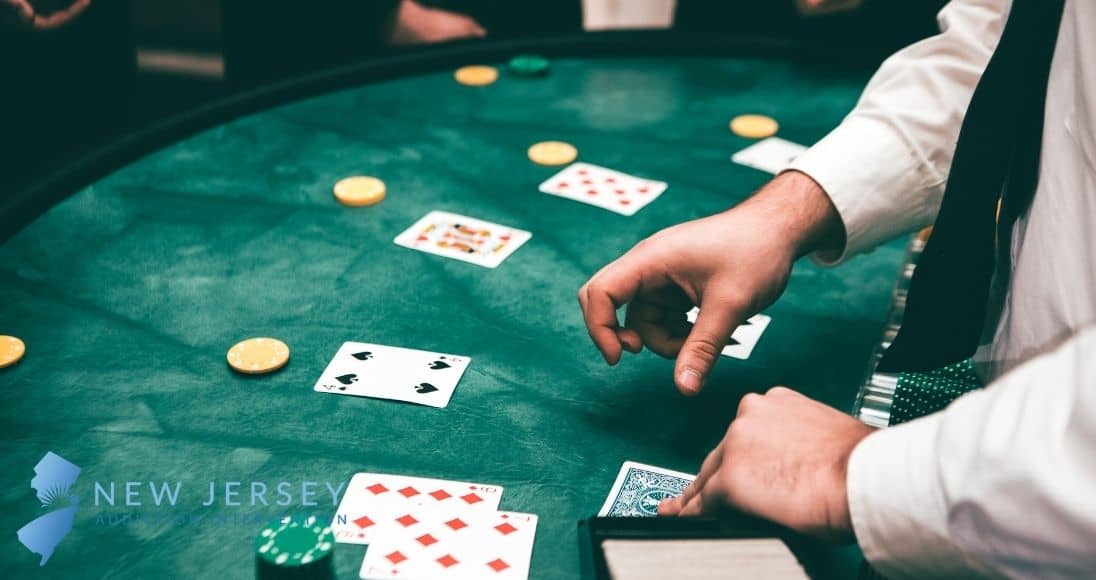Gambling addiction and substance abuse may not seem related, but the two conditions are connected in many ways. The messages people receive about gambling and using drugs or drinking, people’s biology and genetics, and certain psychological conditions can affect a person’s likelihood of developing an addiction.
If you or someone you love requires addiction treatment, you are not alone. Reach out to the staff at New Jersey Addiction Interventions to learn about the high-quality, flexible addiction treatment programs we offer.
Symptoms of Gambling Addiction and Substance Abuse
When a person is addicted to gambling, drugs, or alcohol, the addiction can quickly become the center of their life. In a short time, the course of their life may be drastically altered. Without finding treatment to address the physical, emotional, and environmental aspects of addiction, they may continue down a path with dire consequences. The first step in getting addiction treatment is to recognize that there is a problem.
Symptoms of Gambling Addiction
- Distress or anxiety related to gambling
- Increasing risks/bets/wagers
- Lying or hiding their gambling
- Losing a job because of gambling
- Sudden financial problems
- Unable to stop gambling on their own
Symptoms of Addiction to Drugs or Alcohol
- Needing more of the substance to get the same effect
- Experiencing withdrawal symptoms when attempting to stop or cut back
- Falling behind at work or in school, or losing their job
- Continuing to use the substance despite negative consequences
- Lying or hiding their substance use
- Unable to stop using on their own
The symptoms of gambling addiction and substance abuse have some similarities. This is because addiction, whether to a substance or a behavior, develops in the same part of the brain and causes the person to focus entirely on the addiction.[1]
Environmental Connection Between Gambling and Addiction
For many people in the United States, drinking alcohol and gambling are harmless social activities. They often go hand in hand: poker night and beer, or cocktails and casinos. Have a big win? Buy a round of drinks. Found a lucky machine? Order a drink.
But as often as drugs or alcohol are used to celebrate a big win, people also turn to substances to self-medicate the crushing pain gambling can bring. In many cases, people use drugs or alcohol to dull the anxiety or depression that can result from the major financial losses common in gambling addiction.
A person’s socioeconomic status can affect their likelihood of developing an addiction to gambling. People with lower incomes are more likely to gamble and have a higher risk of developing a gambling disorder.[2]
While many people may be able to enjoy these parts of our culture without becoming addicted to them, some people will develop an addiction that changes their life.
Physiological Connection Between Gambling Addiction and Substance Abuse
Gambling and abusing drugs or alcohol do not seem to have much in common, but many people who have a gambling addiction also struggle with alcohol abuse. Gambling, drugs, and alcohol all affect the same reward centers in the brain. Because substance abuse and gambling work in the same way on the brain, people who are prone to gambling addiction are also thought to be more likely to develop other kinds of addictions.[3] This includes addiction to drugs and alcohol.
While there is no surefire way to determine who will become addicted to gambling, drugs, or alcohol, there are some genetic and physiological factors that make it more likely that a person will develop an addiction. Family history is one of the strongest risk factors for developing an addiction. If one of your parents struggles with addiction, it is more likely that you will develop one, too.[3]
Psychological Connections Between Gambling and Addiction
There is an overlap between certain mental health conditions and gambling addiction. Research is being done to try to understand this connection so that effective treatment programs can be developed. What is clear is that people with gambling addictions are also more likely to have a range of behaviors and mental health conditions, including:[4]
- Impulsivity
- ADHD
- Antisocial personality disorder
- Anxiety
- Depression
- Bipolar disorder
- Risky sexual behavior
When a person has both a mental health condition and addiction, it is important that they receive comprehensive dual diagnosis treatment that can address both conditions at the same time. The more we understand the connection between gambling and addiction, the better we can help the people who need it.
Find Help for Gambling Addiction and Substance Abuse Today
If you or someone you love is struggling with an addiction to drugs or alcohol, or needs help to overcome a gambling addiction, please reach out to the staff at New Jersey Addiction Interventions for information about the treatment programs we offer. We believe that anyone can overcome addiction if they have the support they need. Our programs are designed to empower people in their journey away from addiction.
Don’t wait another day for the treatment you need. Call to speak to one of our admissions counselors today.
References:
Medically Reviewed: January 21, 2022

All of the information on this page has been reviewed and verified by a certified addiction professional.

